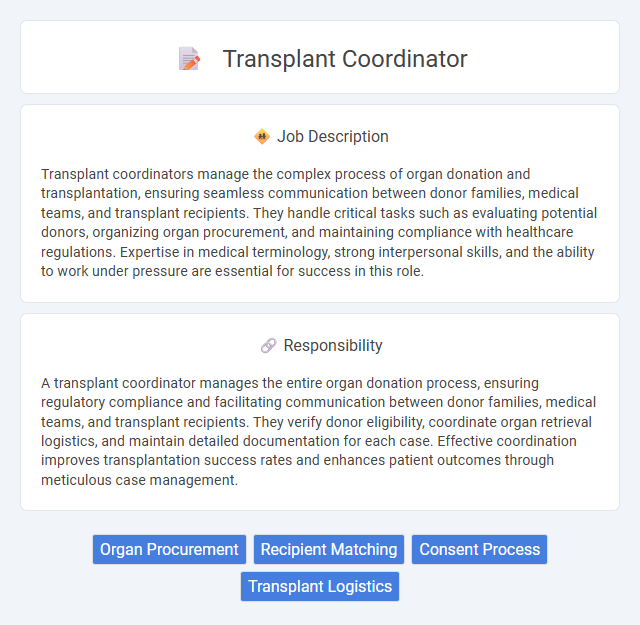
Transplant coordinators manage the complex process of organ donation and transplantation, ensuring seamless communication between donor families, medical teams, and transplant recipients. They handle critical tasks such as evaluating potential donors, organizing organ procurement, and maintaining compliance with healthcare regulations. Expertise in medical terminology, strong interpersonal skills, and the ability to work under pressure are essential for success in this role.
People with strong emotional resilience and excellent communication skills will likely be suitable for a transplant coordinator job, given the high-pressure environment and sensitive nature of the work. Those who can maintain empathy while handling urgent, life-or-death situations may be more successful in managing donor and recipient coordination effectively. Individuals prone to high stress or discomfort with medical interactions might find this role challenging and less suitable.
Qualification
Transplant coordinator positions require a strong background in nursing or healthcare, typically necessitating a registered nurse (RN) license and specialized training in organ transplantation. Key qualifications include experience in critical care or surgical nursing, certification in transplant coordination such as the Certified Procurement Transplant Coordinator (CPTC) credential, and excellent organizational and communication skills to manage donor and recipient cases effectively. Knowledge of regulatory standards like those from the Organ Procurement and Transplantation Network (OPTN) and the United Network for Organ Sharing (UNOS) is essential for ensuring compliance and patient safety.
Responsibility
A transplant coordinator manages the entire organ donation process, ensuring regulatory compliance and facilitating communication between donor families, medical teams, and transplant recipients. They verify donor eligibility, coordinate organ retrieval logistics, and maintain detailed documentation for each case. Effective coordination improves transplantation success rates and enhances patient outcomes through meticulous case management.
Benefit
Working as a transplant coordinator likely offers the benefit of contributing to life-saving procedures, which can provide a strong sense of professional fulfillment. The role probably includes opportunities for developing specialized medical knowledge and improving organizational skills, enhancing career growth potential. Competitive compensation and comprehensive benefits packages, including health insurance and paid leave, may also be common advantages in this position.
Challenge
Transplant coordinators likely face significant challenges in managing the complex logistics of organ donation and transplantation, requiring precise coordination between medical teams, donors, and recipients. The role probably demands exceptional emotional resilience due to the high-stress environment and sensitive nature of working with patients and families during critical times. Navigating regulatory compliance and ethical considerations may also present ongoing difficulties that require careful attention and adaptability.
Career Advancement
Transplant coordinators play a critical role in managing organ donation logistics and patient care coordination, which offers expansive opportunities for career growth within the healthcare sector. Mastery in transplant protocols, interdisciplinary communication, and patient advocacy can lead to leadership positions such as program manager or transplant director. Advanced certifications and specialized training in transplant medicine significantly boost prospects for upward mobility and higher earning potential.
Key Terms
Organ Procurement
Transplant coordinators specializing in organ procurement manage the critical process of identifying potential donors, obtaining consent, and ensuring the timely retrieval and preservation of organs for transplantation. They coordinate with hospital teams, surgical staff, and transplant centers to facilitate organ viability and compliance with regulatory standards. Expertise in medical protocols, communication skills, and ethical considerations are essential to optimize organ donation outcomes and save lives.
Recipient Matching
Transplant coordinators play a critical role in recipient matching by evaluating compatibility factors such as blood type, tissue typing, and medical urgency to ensure optimal outcomes. They collaborate with medical teams and organ procurement organizations to identify suitable candidates for transplantation while minimizing rejection risks. Efficient recipient matching directly impacts transplant success rates and patient survival.
Consent Process
Transplant coordinators play a critical role in managing the consent process, ensuring that donors or their families fully understand the medical, legal, and ethical implications of organ donation. They facilitate clear communication, obtain informed consent, and adhere to regulatory guidelines to maintain compliance and respect donor autonomy. Effective consent management by transplant coordinators directly impacts the success and ethical integrity of transplantation programs.
Transplant Logistics
Transplant coordinators manage transplant logistics by organizing donor-recipient matching, arranging organ transportation, and ensuring timely communication between surgical teams to optimize transplant success rates. They coordinate critical tasks including donor identification, organ retrieval scheduling, and preservation of organs during transit, adhering to regulatory protocols and standards. Efficient transplant logistics reduce ischemic time and improve patient outcomes by facilitating seamless collaboration among hospitals, labs, and transportation services.
 kuljobs.com
kuljobs.com